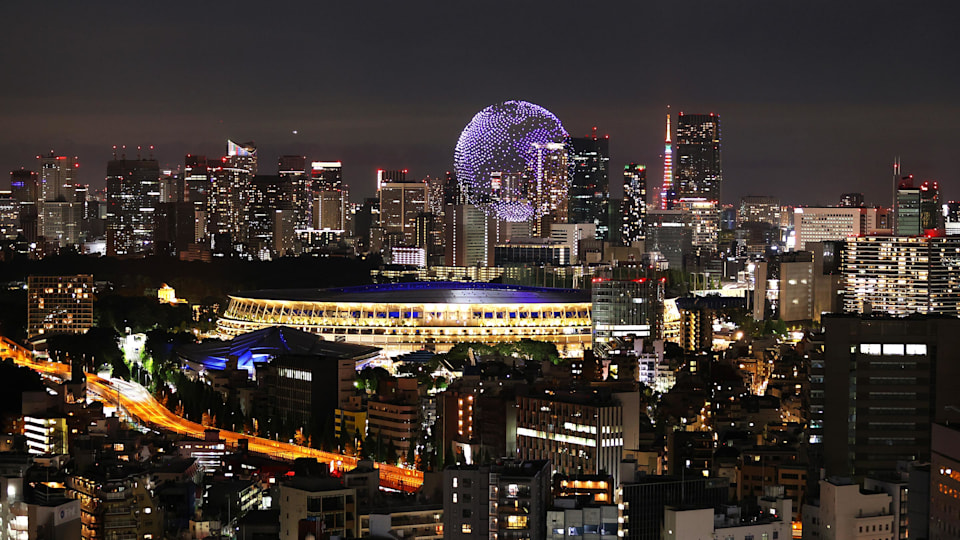Spectacular Intel Drone Light Show helps bring Tokyo 2020 to life
A dazzling Drone Light Show by Worldwide Olympic Partner Intel proved to be one of the highlights of the Opening Ceremony, as Tokyo 2020 came to life with a spectacle that highlighted the unifying power of the Olympic Games.

Following the traditional Parade of Nations, which saw athletes from 205 National Olympic Committees march into Tokyo’s Olympic Stadium alongside those of the Refugee Olympic Team, a fleet of 1,824 Intel Premium drones took to the sky above the venue to form a complex set of geometrical shapes before transitioning into the blue-and-white chequered emblem of Tokyo 2020.
Symbolising the global solidarity and unity in diversity that the Games represent, the next-generation drones then reassembled to form a giant 3D representation of the world, creating one of the most eye-catching moments of the Opening Ceremony.
Intel Drone Light Shows animators collaborated closely with the Tokyo 2020 creative teams to incorporate the drones into the Opening Ceremony narrative, which aimed to show that the world and its athletes are stronger together through a display of connection, unity and hope.
The Intel Premium drones – weighing just 340 grams, less than three-quarters of a pound – are specifically designed for entertainment purposes and are equipped with four LEDs that emit light that is true to colour and unmatched in brightness and vibrancy. Real-time kinematic (RTK) GPS also enables increased positional accuracy for higher resolution animations, sharper imagery and more dynamic 3D animations.
Intel technology at Tokyo 2020
The Drone Light Show is just one of many initiatives that Intel has introduced to help make Tokyo 2020 the most innovative Olympic Games ever.
The Worldwide Olympic Partner has also developed 3D Athlete Tracking (3DAT) technology, which will provide a first-of-its-kind enhancement for broadcast coverage during several athletics events. Using artificial intelligence (AI) and computer vision, 3DAT will enhance the viewing experience with near real-time insights and overlay visualisations during the sprint events (100m, 200m, 400m and 4x100m relay, as well as decathlon/heptathlon). Viewers will be able to understand at what exact moment each sprinter reaches their peak speed and analyse the different phases of the race in detail through a full set of race statistics.
In addition, Intel’s True View technology is providing, for the first time, immersive replays for all basketball matches. True View builds three-dimensional, 360° video through an array of cameras installed high in a stadium or arena. In Tokyo, a total of 35 4K cameras are mounted at the concourse level of the Saitama Super Arena to capture volumetric video that, once processed, renders 360° replays, bird's-eye views, stunning freeze frames and compelling stories from any perspective on the court.
Building on the introduction of 5G at the Olympic Winter Games PyeongChang 2018, Intel is also helping to demonstrate the expanded possibilities of widespread deployment of 5G networks during Tokyo 2020. In collaboration with domestic partner NTT DOCOMO, Intel is providing technology to support the utilisation of the 5G network infrastructure, improving connectivity and enabling new possibilities for immersive experiences. This includes showcasing innovative sports viewing experiences at the Games that communicate events in previously unimaginable ways, featuring ultra-high-resolution broadcasts and artificial reality (AR).
With the Olympic Games becoming increasingly data-driven, Intel has also worked with the IOC to initiate an automated data collection project that will capture and analyse information related to the athletes and entourage, usage of venues and transportation during Tokyo 2020. Cameras and other sensors in venues and onboard Games transport will collect information that will help increase understanding of infrastructure use and improve the accuracy of Games-time operational data, while enhancing efficiency for future Games.
Ahead of the Games, Intel and the IOC also collaborated to create a virtual reality (VR) training system to provide an immersive learning experience for key managers at competition venues. The VR platform helps improve training effectiveness by recreating a realistic experience and providing accurate individual feedback. This pilot initiative, tested for the first time in Tokyo, will help make operational training at future Games more efficient and cost-effective.
Intel became a Worldwide Olympic Partner in 2017 and since then has been working with the IOC to reimagine the future of the Olympic Games through new levels of interaction, connectivity and fan experiences.